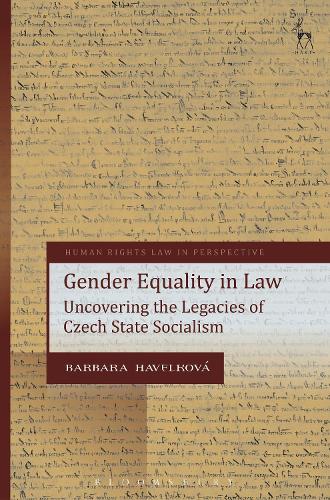
Gender Equality in Law: Uncovering the Legacies of Czech State Socialism
(Hardback)
Publishing Details
Gender Equality in Law: Uncovering the Legacies of Czech State Socialism
By (Author) Barbara Havelkov
Bloomsbury Publishing PLC
Hart Publishing
1st June 2017
United Kingdom
Classifications
Tertiary Education
Non Fiction
Gender studies, gender groups
342.4371087
Physical Properties
Hardback
368
Width 156mm, Height 234mm
689g
Description
"Since the fall of the Berlin wall there has been a surprising dearth of high quality of scholarship on legal culture in the communist successor states of East Central Europe. In this excellent book Barbara Havelkova engages with the reversal of many of the advances the socialist period made in gender relations, examining the historical roots of the current failure of Czech law to engage with the discriminatory practices that have negatively affected the lives of women. She does this by a forensic excavation of law, discourses and practices of the socialist era revealing the patriarchal assumptions underpinning them that became deeply embedded in Czech legal culture, and that have been carried forward to the present day. The book is a compelling read. It provides answers to many of the questions that have perplexed feminists about the post-soviet transition and at the same time speaks more generally to the debates surrounding the troubling rightward shift in the politics of the communist successor states of Europe." Professor Judith Pallot, President of the British Association for Slavonic and East European Studies "In Gender Equality in Law: Uncovering the Legacies of Czech State Socialism, Barbara Havelkov offers a sober and sophisticated socio-legal account of gender equality law in Czechia. Tracing gender equality norms from their origins under state socialism, Havelkov shows how the dominant understanding of the differences between women and men as natural and innate combined with a post-socialist understanding of rights as freedom to shape the views of key Czech legal actors and to thwart the transformative potential of EU sex discrimination law. Havelkovs compelling feminist legal genealogy of gender equality in Czechia illuminates the path dependency of gender norms and the antipathy to substantive gender equality that is common among the formerly state-socialist countries of Central and Eastern Europe. Her deft analysis of the relationship between gender and legal norms is especially relevant today as the legitimacy of gender equality laws is increasingly precarious." Professor Judy Fudge, Kent Law School Gender equality law in Czechia, as in other parts of post-socialist Central and Eastern Europe, is facing serious challenges. When obliged to adopt, interpret and apply anti-discrimination law as a condition of membership of the EU, Czech legislators and judges have repeatedly expressed hostility and demonstrated a fundamental lack of understanding of key ideas underpinning it. This important new study explores this scepticism to gender equality law, examining it with reference to legal and socio-legal developments that started in the state-socialist past and that remain relevant today. The book examines legal developments in gender-relevant areas, most importantly in equality and anti-discrimination law. But it goes further, shedding light on the underlying understandings of key concepts such as women, gender, equality, discrimination and rights. In so doing, it shows the fundamental intellectual and conceptual difficulties faced by gender equality law in Czechia. These include an essentialist understanding of differences between men and women, a notion that equality and anti-discrimination law is incompatible with freedom, and a perception that existing laws are objective and neutral, while any new gender-progressive regulation of social relations is an unacceptable interference with the natural social order. Timely and provocative, this book will be required reading for all scholars of equality and gender and the law.
Reviews
This is the first book since 1989 to apply a feminist and critical studies methodology to the legal system of a CEE country. It is therefore indispensable to any scholar writing about gender and equality in CEE and a mustread for anyone with an interest in understanding the CEE legal culture(s) and societies. -- Elena Brodeala * European Journal of Legal Studies *
This book is an excellent work of feminist legal genealogy, bringing a useful contribution towards our understanding of the relationship of equality, gender and the law, as well as discrimination and rights. It also shows the limited impact of anti-discrimination law if it is not underpinned by general social acceptance of the need for gender equality in all spheres, something that the current #MeToo campaign has made relevant also in the West. -- Jana Nahodilov * BASEES Newsletter *
What Havelkov sets in train ... is a thorough engagement with feminist legal materials to trouble conventional accounts of EU implementation in recent accession states. Her book is methodologically distinctive, offering a fluid blend of archival analysis, doctrinal excavation (both domestic and EU), and socio-political theory. Her resulting contribution to scholarly literature through this monograph is undoubtedly fascinating and remarkably broad. -- Lydia Hayes, Cardiff University * Journal of Law and Society *
Author Bio
Barbara Havelkov is the Shaw Foundation Fellow in Law at the University of Oxford.
